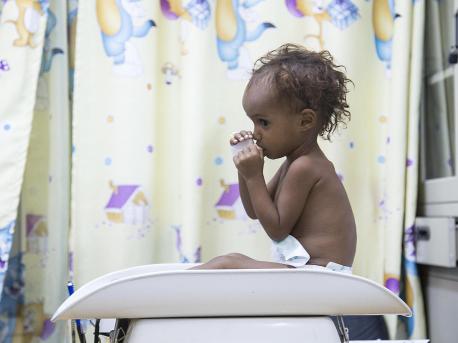
UNICEF Is Bringing Malnourished Children Back to Life in Yemen
UNICEF and partners are working tirelessly all over the world to save and protect children.
Children in Yemen are growing up in impossible circumstances. After four years of civil war, homes are in ruins, schools have been destroyed and medical care is hard to come by. Spiralling inflation has pushed food prices sky-high: More than half the population wakes up hungry every day.
Sixteen-month-old Saba weighed less than 13 pounds when her mother rushed her to the UNICEF-supported Al-Zaidiah Therapeutic Feeding Center, run by the Taybah Foundation for Development, a local health organization, in the port city of Hudaydah. She had a high fever with severe diarrhea and was developing pneumonia.

"Because of the war, my husband can't find work in order to get money," said Saba's mother, Ashwaq Al-Raei. "We haven't received assistance from the local organizations in Hudaydah. This has severely affected Saba."

At the center, Dr. Waleed Ibrahim diagnosed Saba with severe acute malnutrition and admitted her for intensive treatment. "Children Saba's age are supposed to be over 17 pounds," he said. He immediately started her on a regimen of nutrient-rich therapeutic milk. The center also provides meals for worried mothers attending to their sick children.

The war has devastated Yemen's economy and left Saba's parents scrambling to provide food for Saba and her brothers and sisters. There is never enough money to pay for food for the whole family. "I sometimes sell sheep to get money," said Al-Raei. "We were keeping bees for honey in the past, but everything has gone. We used to eat bread and drink tea, but now we don't even have bread."

After three days of antibiotics and nutritional treatment, Saba's condition improved significantly. The diarrhea and fever stopped, and her cough started to go away. Her mother was happy to see her daughter recovering, but still concerned because her other children back home don't have anything to eat.
"After her recovery, Saba was referred to the outpatient clinic to monitor her weight and to give her the appropriate nutrition," said Dr. Ibrahim. "If she doesn't improve, she will be referred again to us for in-patient management."

Some 400,000 children under the age of 5 in Yemen are suffering from severe acute malnutrition (SAM). Many parents, like Saba's, struggle to feed their children. "It's not rare to see the same mother coming back with another child who also suffers from malnutrition," said Dr. Waleed. "That's why UNICEF added health educators to the medical teams to educate mothers about the quality of food, hygiene and family planning practices."
Top photo: Little Saba was suffering from acute malnutrition, fever and diarrhea when her mother brought her to the UNICEF-supported Therapeutic Feeding Center of Al-Zaidiah in Hudaydah, Yemen. All photos by Taha Almahbashi for UNICEF
HOW TO HELP
There are many ways to make a difference
War, famine, poverty, natural disasters — threats to the world's children keep coming. But UNICEF won't stop working to keep children healthy and safe.
UNICEF works in over 190 countries and territories — more places than any other children's organization. UNICEF has the world's largest humanitarian warehouse and, when disaster strikes, can get supplies almost anywhere within 72 hours. Constantly innovating, always advocating for a better world for children, UNICEF works to ensure that every child can grow up healthy, educated, protected and respected.
Would you like to help give all children the opportunity to reach their full potential? There are many ways to get involved.





